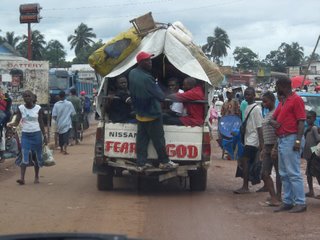
Yesterday evening a few members of the farm management team at Cuttington, and myself, bumped along a narrow, barely passable red dirt road, for several miles, through a rubber plantation, until we came upon our destination: the Leprosy Colony.
It looked like any other village in the area at first glance: a mix of houses constructed from sticks, mud, and palm roofs, and houses of mud bricks and tin. All the children in the colony came running up and swarmed around the car. "Alo, Alo!" they yelled to me. The ones I saw first had big happy smiles, though they were covered in dirt. Many of the small children don't wear clothes, but those who were clothed only had half a tattered outfit on (all western clothes), and flip-flops.
This was one in a series of stops we were making to do preliminary needs assessments in the communities surrounding the University. We had been notified of some potential grant monies for outreach programs, and were fact finding before developing a proposal.
As we went to look at the pigs and chickens people were raising, the children swarmed around me. They wanted to shake my hand, and as each one did, they would laugh with glee and then come back for another one. Some of them just poked me and ran off laughing. I'm used to children laughing at me, there are so few white people around. But these children's laughter was contagious, and pretty soon I was laughing at me too.
"We have 140 children," our guide told us, as they milled around us. "We have a school here, but no teachers, none of our children go to school." After looking at the animals, he took us into the old part of the village that was built by missionaries in 1950. "There are 54 leprosy patients here, and all of their families make 240. This boy here, his mother, there, has leprosy, and he has it." The boy he pointed to was about 10, or 12, it's hard to tell with malnourished children. His eyes didn't shine like the other children, he looked old. I said hello to him and looked around the group again. Their bright eyes had distracted me from their pain. Several had scabs all over their scalps, and many had distended bellies. "We need clean water," our guide said. "The pump does not work, so our water comes from the swamp, and when it rains everything is washed to the swamp. We have no latrines, we need latrines."
We also learned that the colony had organized into farming groups and had a vegetable project, and a fish pond, and that the nearby hospital ( Phebe Hospital, a Lutheran institution) provided free care to leprosy patients, but not their families. People in the colony cannot work, so they survive on subsistence farming and selling some crafts and woven palm mats.
As we were leaving, the children swarmed around the truck again. "Bye, Bye" they shouted this time. The boy with leprosy who our guide had pointed at was standing right by the car, and I shook his hand. He never smiled, just gazed at me.
As we drove away some of the children returned to playing soccer. The newscaster on UNMIL (UN Mission In Liberia) Radio said "150 million children die every year because they don't have access to clean drinking water. 2 Billion people world wide do not have access to clean drinking water." In the US we hear these numbers, and we see images on TV of filthy muddy villages with starving children, and we care, but at some level it remains unreal, so different from our own experience it's hard to conceive. Maybe we feel guilty for a few minutes, or maybe we get involved and sponsor a child, but in the end we return to our lives, because what else can we do. But I think what we miss out on is the humanity of it. When you look people in the eye, when you shake their hand, when you greet each other, you become equals, you see that they are no different from you, you touch their suffering.
Before I came here I talked about wanting to reach out and share the experience of the other. I have not shared their experience. I am well fed, and housed, and clothed, I have filtered water, and someone to haul it for me. But I have met them, and heard some of their needs and concerns. And what I have found is that there is no "other". We are one family. Children everywhere laugh the same and draw the same stick figures, and chase the same balls.
And adults everywhere worry about their children, and providing for their families. I wasn't depressed when I left the Leprosy Colony, something about them filled me up. Perhaps it was their inherent joy, joy without reason. The beautiful thing about Liberia is how much people realize their need for one another. And we (Americans) need them too!
I leave you with the song they sing at church while passing the peace: "Reach out and touch somebody's hand, make this a better place if you can."

